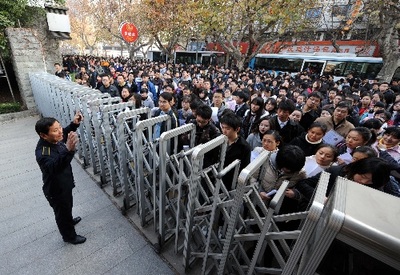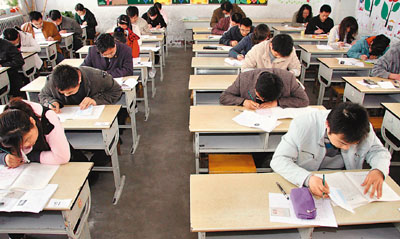The Autocratic Logic of Meritocracy: Grassroots Political Co-optation in Contemporary China.
For a Leninist party-state like China, entry-level political selection is of critical importance, as it functions as a gate keeper to the exclusive and hierarchical official corps. Who can participate and what criteria are used in the selection process not only affects the composition of the political elite class, but also its relationship with the rest of the society. At the turn of the century, the Chinese Communist Party (CCP) replaced its decades-long practice of internal hiring with a standardized examination to recruit new cadres. The National Civil Service Examination (NCSE), with meritocracy as its guiding principle, has been met with immense public enthusiasm, attracting tens of millions of college-educated citizens to participate each year.
Despite its prominent place in Chinese political life and the far-reaching implications, NCSE has largely eschewed scholarly attention. How does the contemporary civil service exam work? How is the meritocratic principle enforced? More importantly, why does the CCP prefer meritocracy over patronage in its entry-level selection, when the latter figures more prominently in higher-level selection?
In this book, I develop a theory that centers on the role of upward mobility in authoritarian regime dynamics. I argue that meritocratic political selection can co-opt individuals in a regime, not by directly distributing rents to them, but by offering them an opportunity to ascent into rent-paying positions, i.e., upward mobility. Compared to patronage-based selection, NCSE extends this opportunity to many more individuals of non-elite background and allows them to compete based on talent and effort. By providing a limited but steady stream of upward mobility via NCSE, the CCP renders large swaths of the Chinese citizenry more acquiescent and supportive of the status quo, thus bolstering regime stability.
To substantiate my argument, I draw on qualitative, quantitative, and experimental evidence collected from 18 months of fieldwork. The first part of the book provides a comprehensive description of NCSE, documenting its origin and development over time, its implementation at various levels of government, and the public reaction and attitude towards it. The second part of the book triangulates the complex dynamic between the CCP leadership, local officials, and ordinary citizens, as the regime seeks to shape NCSE into an institution of mass co-optation. I employ two survey experiments to demonstrate that, by imposing institutional constraints on local officials, the CCP leadership can make its commitment to meritocratic selection credible and enforceable. Analyzing data from nationally representative surveys, I find that NCSE – especially with its increasing institutionalization – forges a persistent perception of upward mobility among college-educated citizens and weakens their redistributive demand on the regime. More generally, NCSE also strengthens public support for local government and contributes to the legitimacy of the CCP regime. Combined, these findings enrich to our understanding of meritocracy and its political effects; they also highlight the role of upward mobility in relation to regime resilience.
Despite its prominent place in Chinese political life and the far-reaching implications, NCSE has largely eschewed scholarly attention. How does the contemporary civil service exam work? How is the meritocratic principle enforced? More importantly, why does the CCP prefer meritocracy over patronage in its entry-level selection, when the latter figures more prominently in higher-level selection?
In this book, I develop a theory that centers on the role of upward mobility in authoritarian regime dynamics. I argue that meritocratic political selection can co-opt individuals in a regime, not by directly distributing rents to them, but by offering them an opportunity to ascent into rent-paying positions, i.e., upward mobility. Compared to patronage-based selection, NCSE extends this opportunity to many more individuals of non-elite background and allows them to compete based on talent and effort. By providing a limited but steady stream of upward mobility via NCSE, the CCP renders large swaths of the Chinese citizenry more acquiescent and supportive of the status quo, thus bolstering regime stability.
To substantiate my argument, I draw on qualitative, quantitative, and experimental evidence collected from 18 months of fieldwork. The first part of the book provides a comprehensive description of NCSE, documenting its origin and development over time, its implementation at various levels of government, and the public reaction and attitude towards it. The second part of the book triangulates the complex dynamic between the CCP leadership, local officials, and ordinary citizens, as the regime seeks to shape NCSE into an institution of mass co-optation. I employ two survey experiments to demonstrate that, by imposing institutional constraints on local officials, the CCP leadership can make its commitment to meritocratic selection credible and enforceable. Analyzing data from nationally representative surveys, I find that NCSE – especially with its increasing institutionalization – forges a persistent perception of upward mobility among college-educated citizens and weakens their redistributive demand on the regime. More generally, NCSE also strengthens public support for local government and contributes to the legitimacy of the CCP regime. Combined, these findings enrich to our understanding of meritocracy and its political effects; they also highlight the role of upward mobility in relation to regime resilience.


